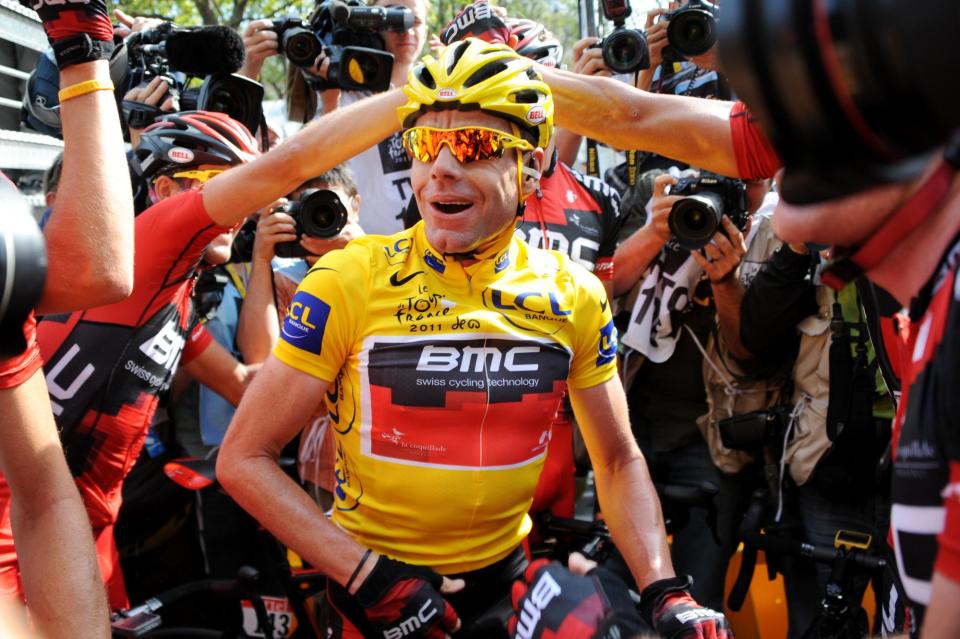Australian cycling entered a new era when Cadel Evans conquered the Tour de France

In Australian cycling, there are two eras: BC and AC.
For almost 100 years, since the first Australians competed in a Tour de France in 1914, none won the grandest of Grand Tours. But as more of them entered the race from the 1980s onwards, other records began to fall.
Phil Anderson secured the first stage win by an Australian in 1982 and twice held the hallowed yellow general classification jersey mid-race. Robbie McEwen headlined a golden era of Australian sprinters in the early 2000s, winning three green jerseys as his compatriot Baden Cooke claimed another in the points classification.
Related: Cathy Freeman’s 2000 gold was a landmark in every measure of Australia’s history | Jonathan Horn
By 2010 a full team’s worth of Australians were competing in the three-week stage race each year. But the overall victory, the opportunity to pull on the maillot jaune after the final stage on the Champs-Élysées, continued to elude the Australian contingent.
Then, in 2011, Cadel Evans changed everything. In a moment, his yellow jersey triumph demarcated Australian cycling for ever: Before Cadel and After Cadel. A golden era began with a remarkable individual time trial on the penultimate stage in Grenoble.
Evans, a champion mountain biker in his youth who later switched to the road, had come close before. In his debut tour in 2005 the Australian finished eighth; a year later he was just off the podium in fourth. Two runner-up results followed, in 2007 and 2008, before disappointing performances in subsequent years.
From the start 2011 felt different. Evans entered as world champion and finished second on the opening stage, before nabbing a stage win – the third of his career – a few days later. The Australian remained in general classification contention across the first week, then the second, and then early through the third. The yellow jersey was within reach.
But on stage 18, with only a handful of days to go, Evans’ campaign almost fell apart. The weary peloton were facing down the mighty Col du Galibier, the highest stage finish. With 60km remaining, a general classification rival, Andy Schleck, attacked on the Col d’Izoard to establish a sizeable advantage – looking to take the yellow jersey and build a sufficient time gap with only one mountain stage and a penultimate day time trial to go (the final stage in Paris is a procession for the general classification riders, with no time won or lost).
Related: David Squires on … 50 of Australia’s greatest sporting moments
There was a sense of deja vu. Twice before Evans had not quite been able to make up the general classification gap during the last time trial. As Schleck extended his virtual lead, the seconds Evans would need to make up in the race against the clock in Grenoble ticked upwards.
The peloton squabbled over who would commit to the chase. But with less than 10kim to go up the Galibier, Evans moved to the front of the chasing group and began to grind. Every second regained from Schleck would make the difference two days later. The yellow jersey was in the balance.
“Despite everyone panicking,” Evans recalled a decade later, to the Detour podcast, “you learn to stay calm and just concentrate on what you need to do. I really had to put all my years of experience to use that day, on that final climb, and just ride the fastest tempo I could.”
It was a remarkable, almost single-handed chase; in the end, Evans crossed the line two minutes down from Schleck – only a minute back in the overall standings. He survived a mechanical scare the next day before convincingly beating Schleck in the time trial on the streets of Grenoble, overturning the deficit and winning the Tour de France by more than 90 seconds.
And with that, Australian cycling changed – BC, AC.
Cadel now needs no introduction; he has become known across the country by his first name alone. Aptly, for someone whose own love of cycling was supercharged by Tour de France broadcasts on SBS, Evans’ win turned the three-week race into annual appointment viewing for millions of Australians.
Two years ago Jai Hindley became only the second Australian – after Evans – to win a Grand Tour, clinching the Giro d’Italia. Hindley has spoken about the childhood inspiration he gained from Evans’ triumph, and the guidance the now-retired cycling great has provided him.
Evans, too, stood on the shoulder of giants – the early pioneers including Sir Hubert Opperman and Russell Mockridge, the 1980s wave of Anderson, Allan Peiper and Neil Stephens, the early 2000s stars. Those who follow build on this collective legacy – Caleb Ewan’s countless Grand Tour stage wins, Richie Porte’s podium finish in France in 2020 and Hindley’s purple patch. But Evans’ yellow jersey will always mark a decisive moment for Australian cycling – the nation’s first Grand Tour winner, and only the second non-European to win the Tour de France.
Immediately after his stage 20 time trial, having just taken yellow from Schleck, Evans could barely contain his shock. “I can’t believe it, I can’t believe it,” he repeats. The unthinkable had become real; the dreams of bleary-eyed fans fulfilled in an instant. Australian cycling had changed for ever.

 Yahoo Sports
Yahoo Sports 